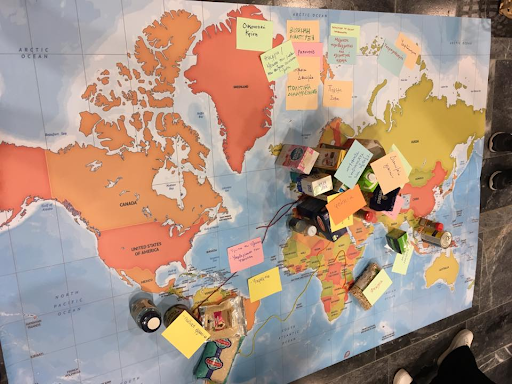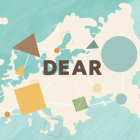DEAR rethinking how we produce and consume
News details

Every day, our consumption choices send ripples across the globe—affecting environments, communities, and economies far beyond our immediate surroundings. Policies can guide us towards sustainable and ethical choices, in Europe and beyond. But also individual choices create bottom-up pressure towards positive change. Building a critical mass of people can serve to lobby businesses and decision makers to commit to practices that have a net positive - rather than negative - impact on the globe and its residents.
Since the 1970s, the EU DEAR Programme has supported civil society organisations (CSOs) and local authorities (LAs) in Europe to help people understand these global connections and the impact of individual, business and government choices. Building on proven methods of global citizenship education (GCE), DEAR projects lead to informed choices and enable action for more systemic change.
Who pays the cost?
In our interconnected world, production often occurs in one country with impacts felt elsewhere—consider the cocoa in our chocolate or fish from the oceans. DEAR projects draw the connections between personal habits - from the food we eat, to the clothes we wear, and the phones we use - and global issues and today’s Sustainable Development Goals (SDGs).
EU DEAR projects have successfully campaigned for justice along global supply chains that lead to consumers in Europe. Thanks to advocacy of “Fish Forward”, two major UK supermarket chains committed to end illegal fishing and respect human rights in their seafood supply chains. One of their trade managers highlighted the importance to “ensure (that) all workers are operating within a safe and ethical environment.” Watch the DEAR-produced WWF video about how small fishing communities in the Global South are affected by illegal fishing.
With the help of another DEAR project, “Make ICT Fair”, 10 000 migrant workers in Thailand were reimbursed the equivalent of 30-60 days of wages for illegal recruitment fees. Why does it matter? Because those workers produce printers that are sold on Western markets, and migrant workers paying excessive and unlawful recruitment fees are at risk of forced labour through debt bondage. So, the printer on our desks could be produced under modern slavery.
Today, the DEAR legacy continues with projects campaigning for sustainable global consumption and production chains. "Turn the Tables” is helping local authorities and public institutions procure food for their canteens in eco-friendly ways, including through self-supply, by avoiding waste and encouraging sustainable consumer habits.
“Fashioning a Just Transition” lobbies the world of fashion as well as decision-makers for low-carbon, sustainable, and just practices in the global fashion industry. It focuses on young and female workers in the clothing industry.
Driving Policy Change
For longer-term impact, DEAR projects also campaign for fair trade and other ethical policies, via advocacy and campaigns. Policies and legislation can bind companies to sustainable and ethical choices. A critical mass of people can influence decision-makers, who draft and implement regulations.
Bringing global issues to the political agenda, EU DEAR projects have addressed unfair trading practices, worked to improve anti-trafficking regulations, as well as promoted innovative education policies. In Finland, for example, the “Different Stories” campaign of “Frame-Voice-Report” gave a voice to a victim of human trafficking from Nigeria, Ithohan. Watch the campaign video in which she bravely describes her years caught in prostitution, and calls for “no human to be for sale.”
Thanks to Itohan’s powerful testimony and the efforts of volunteers, journalists, and relevant Finnish ministry staff, the project inspired the government to appoint an Anti-Trafficking Coordinator, as well as to draft new legislation, now protecting the children of the victims of human trafficking in Finland.
Today, DEAR projects continue to advocate for more inclusive, gender-transformative, climate-just and socially responsible legislation. “Funding Fairer Futures” is campaigning for continued effective funding for sustainable development. While “Tackle” empowers migrant activists to advocate for anti-discriminatory policies.
From reducing food waste, to combating unfair trade practices, to enhancing social justice, EU DEAR projects advocate and advise for policies that foster sustainable development at local, national, and European levels.
Building on past impact
Current DEAR projects are building on the legacies of past ones. Read the many stories and results, as well as the broader key findings from activities from 2018-2022. Continued DEAR work can ensure that the past projects have a lasting impact. New successes can be achieved through longer-term policy changes. Expert advice and public support for sustainable policies may need to be maintained throughout sometimes long legislative processes. Or to simply avoid reversals, pressure needs to be held strong.
The EU DEAR Programme and its implementers demonstrate how local actions can have a global impact - in both damaging and empowering ways. They provide opportunities to act for a more sustainable and equitable world. The current 16 EU DEAR projects continue to advocate for sustainable policies, community and individual behavioural changes, as well as corporate social responsibility and institutional accountability.
Find out more
Read the Achievement Report to learn about past DEAR results and impact. Sign up for the DEAR quarterly newsletter for current developments.

Log in with your EU Login account to post or comment on the platform.